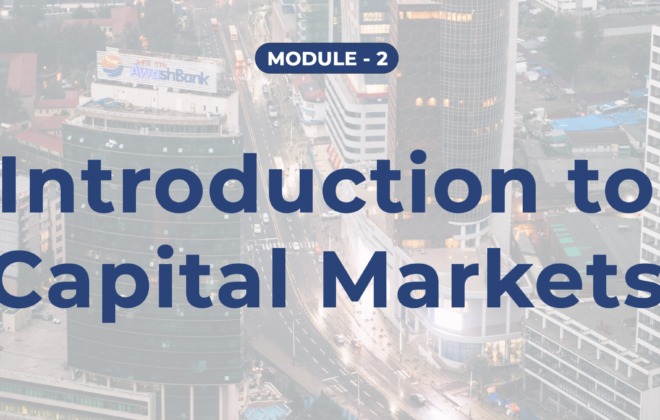Module 2 – Introduction to Capital Markets

About Course
Welcome to “Introduction to Capital Markets.” We’re about to embark on an exciting journey into the world of finance and investment, where you’ll gain a solid foundation in understanding how capital markets work and why they are so crucial to the economy. Whether you’re new to this field or just looking to brush up on the basics, this module is designed to make you feel at home while learning these essential concepts.
Course Content
Module Introduction
-
Module Introduction
02:20
Chapter 1 – Overview Capital Market
Chapter 2 – Key Players and Institutions in Capital Markets
Chapter 3 – Basics of Equities and Stock Markets
Chapter 4 – The Role of Capital Markets in the Economy
Module Summary
Student Ratings & Reviews
Nice
I am enjoying the learning.
This module gives a wide view of the capital market and its value
yes, it good but notes should be downloadable for further refernce
Good
I loved this course because it defined major roles and parts of capital market and securities exchange. I’ve identified the difference between common and preferred stocks, I have understood the different parties in capital market and their roles. It was very interesting I can’t wait to continue on to the next module.
My name is Addisu Ababu
Very helpful course indeed. Thank you
My full Name is Abreham W/meskel Bayu
Valuable
great
Module Two provided a solid overview of the Ethiopian capital markets landscape, focusing on the key players and their functions. It was particularly helpful to understand the roles of the Ethiopian Capital Market Authority (ECMA), the Central Securities Depository (CSD), and the emerging role of investment banks and advisors within the local context.
The distinction between the primary and secondary markets, as well as the discussion on price discovery and liquidity, were crucial for grasping the fundamental mechanics of the market. The module also effectively highlighted the differences between OTC markets and stock exchanges, which is important for understanding the nuances of trading.
Perhaps a future iteration could delve deeper into the specific regulations and operational procedures currently being established by the ECMA, as this is a rapidly evolving area. Additionally, real-world examples of transactions and the participation of local institutional investors would further enrich the learning experience.
Overall, Module Two laid a strong foundation for understanding the structure and operation of the Ethiopian capital market.
The distinction between the primary and secondary markets, as well as the discussion on price discovery and liquidity, were crucial for grasping the fundamental mechanics of the market. The module also effectively highlighted the differences between OTC markets and stock exchanges, which is important for understanding the nuances of trading.
Perhaps a future iteration could delve deeper into the specific regulations and operational procedures currently being established by the ECMA, as this is a rapidly evolving area. Additionally, real-world examples of transactions and the participation of local institutional investors would further enrich the learning experience.
Overall, Module Two laid a strong foundation for understanding the structure and operation of the Ethiopian capital market.
Exactly!!!!
Nice!
I understand many things about The financial sector refers to the part of the economy that provides financial services to consumers, businesses, and governments. It encompasses a wide range of institutions, markets, and instruments that facilitate the flow of funds and the management of financial risks.
Excellent !
Taking this course give me a chance to acquire basic concepts of capital market and its role in nations economy development. so it was interesting except system is somewhat poor to transfer from one step to another stem.
Course are very interesting but the website is very slow to open the next page it needs updating
It was a very informative and educational course.
good module






